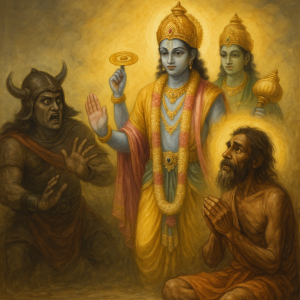The Majestic Elephant of the Royal Grove
In a vast kingdom ruled by a pious king devoted to Lord Viṣṇu, there lived a royal elephant named Kuñjara. Massive in size and known for its strength, this elephant was trained for royal processions and temple festivals. Though it had no understanding of mantras or śāstra, Kuñjara had developed a strange habit: whenever it passed by the temple of Lord Viṣṇu, it would stop and bend its front knees, lowering its head as if offering obeisance.
No one had trained it to do so. The mahouts and temple servants simply observed it over time and marveled. Perhaps, they said, it had learned by watching the king or the brāhmaṇas.
Daily Offering of Flowers
One day, after kneeling before the temple as usual, the elephant plucked a garland of flowers from the palace garden in its trunk and offered it at the temple door before moving on. The temple priest, witnessing this, said with tears in his eyes, “Even the animals feel drawn to the Lord!”
From that day, the elephant continued this simple worship: bowing down and offering a flower or leaf every morning when led past the temple gates.
The End of a Noble Life
Years passed. The king grew old, and so did the elephant. One morning, as it approached the temple gates, Kuñjara collapsed and breathed its last, with a flower still clutched in its trunk.
As astonished crowds gathered, celestial messengers appeared, glowing with golden effulgence. They raised the soul of the elephant in a divine chariot and declared:
“This being, though born in the body of an animal, bowed daily before the temple of the Supreme Lord and offered flowers with sincerity. Such acts, performed without pride or expectation, have cleansed lifetimes of karma. By the Lord’s mercy, this soul is now entering Vaikuṇṭha, the eternal realm.”
The king and his ministers, upon hearing this, became deeply inspired and ordered that no living being be barred from the temple’s outer courtyard, honoring all as potential servants of the Lord.
Lessons to Be Learned:
- Simple gestures of respect toward the Lord, even by animals, are powerful acts of bhakti.
- The Lord notices every act of devotion, no matter how small or who performs it.
- Sincerity of the heart, not scriptural knowledge or birth, is what pleases the Lord.
- As it is written in the Bhāgavatam (2.3.24): “kirāta-hūṇāndhra-pulinda-pulkaśā abhīra-śumbhā yavanāḥ khasādayaḥ / ye ‘nye ca pāpā yad-apāśrayāśrayāḥ śudhyanti tasmai prabhaviṣṇave namaḥ”
“Even those born in sinful families—if they take shelter of the Lord’s devotees—can be purified. Such is the power of Lord Viṣṇu.”
Origin of the Story: Padma Purāṇa – Stories section glorifying the acts of devotion of animals and how even unconscious or instinctive offerings to the Lord become the cause of liberation.

